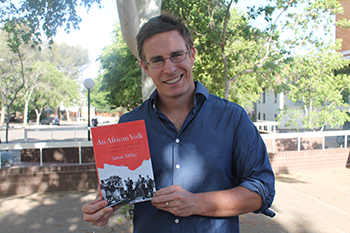Latest News Archive
Please select Category, Year, and then Month to display items
29 March 2023
|
Story Samkelo Fetile
|
Photo Simba Matema
 From left to right: Prof Jean Bernard Lekana-Douki, Director General at the CIRMF; Prof Francis Petersen, Rector and Vice-Chancellor of the UFS; and Prof Jean-Fabrice Yala, Scientific and Technical Director at the CIRMF.
From left to right: Prof Jean Bernard Lekana-Douki, Director General at the CIRMF; Prof Francis Petersen, Rector and Vice-Chancellor of the UFS; and Prof Jean-Fabrice Yala, Scientific and Technical Director at the CIRMF.
The University of the Free State (UFS) recently welcomed senior members from the International Centre for Medical Research in Franceville (CIRMF), Gabon to sign a Memorandum of Understanding (MoU) between the two entities.
CIRMF is a non-profit medical research centre that was established in 1974. Its primary focus is on diagnosing infectious diseases that pose immediate problems in Gabon and the Central African sub-region. The centre is dedicated to improving public health through various initiatives, including the training of Gabonese health executives in doctoral and post-doctoral education.
“The signing of the MoU with CIRMF is a step in the right direction as the UFS continues to strengthen its footprint on the African Continent. This is seminal in driving the university’s internationalisation processes and opening an avenue to expanding research networks, especially in the African continent,” said Bonolo Makhalemele, Coordinator of strategic projects at the Office for International Affairs, UFS.
In the interest of developing broader research collaborations, the CIRMF delegation met with some UFS academics in a series of engagements, particularly in the Health Sciences Faculty and the Natural and Agricultural Sciences Faculty. “The integration of knowledge and practices that emanate from the continent provides opportunities for the co-creation of knowledge that can be shared with the rest of the world,” said Kagiso Ngake, Coordinator for Partnerships, Collaborative Degrees, and Outgoing Mobility at the Office for International Affairs, UFS.
A concrete roadmap was established to formalise the collaborations that resulted from these engagements and will commence as soon as April 2023. “We have laid a solid foundation and are on the way to a strong and rich partnership!” exclaimed Prof Jean Bernard Lekana-Douki, Director General at the CIRMF.
Prof Francis Petersen, Rector, and Vice-Chancellor of the UFS, further highlighted how the newly established partnership with the CIRMF aligns with the mandate of the UFS Vision 130 of expanding the UFS Africa research network.
US author launches book at UFS on African volk
2016-10-17

Dr Jamie Miller, Postdoctoral Fellow at the
University of Pittsburgh and author of
An African Volk: The Apartheid Regime
and Its Search for Survival.
Photo: Rulanzen Martin
“I realised the importance of not just accessing the policies and political approaches of the leaders of the apartheid regime, but understanding the ideas and world views that informed them. Part of the solution to this was to learn Afrikaans.”
This is according to Dr Jamie Miller, a Postdoctoral Fellow at the University of Pittsburgh, on how he went about getting inside the mind of South Africa’s apartheid regime in order to complete his book, An African Volk: The Apartheid Regime and Its Search for Survival.
The book was launched on 11 October 2016 by the Archive for Contemporary Affairs at the University of the Free State on the Bloemfontein Campus.
Volk refers to the Afrikaner nationalist movement
The book is an ambitious new international history of 1970s apartheid South Africa. It is based on newly declassified documents and oral histories, the majority in Afrikaans, which focus on the regime’s attempts to turn the new political climate to its advantage.
The term volk refers to the Afrikaner nationalist movement, also known as Afrikanerdom. The story of Afrikaner nationalism was the medium through which the regime gained power.
Four main messages from the book
Dr Miller says there are four main messages for his readers. Firstly, the apartheid regime looked to contest and hijack new ideas and norms that formed the postcolonial world, and secondly, that we need to start thinking more seriously about the Cold War in terms of domestic politics, not just geopolitics.
Thirdly, South Africa should be integrated into histories of the global South, and lastly, we should conceptualise the apartheid regime by looking at it not just as an imperial holdover, but also by looking at what was happening in the world in the time period in question.